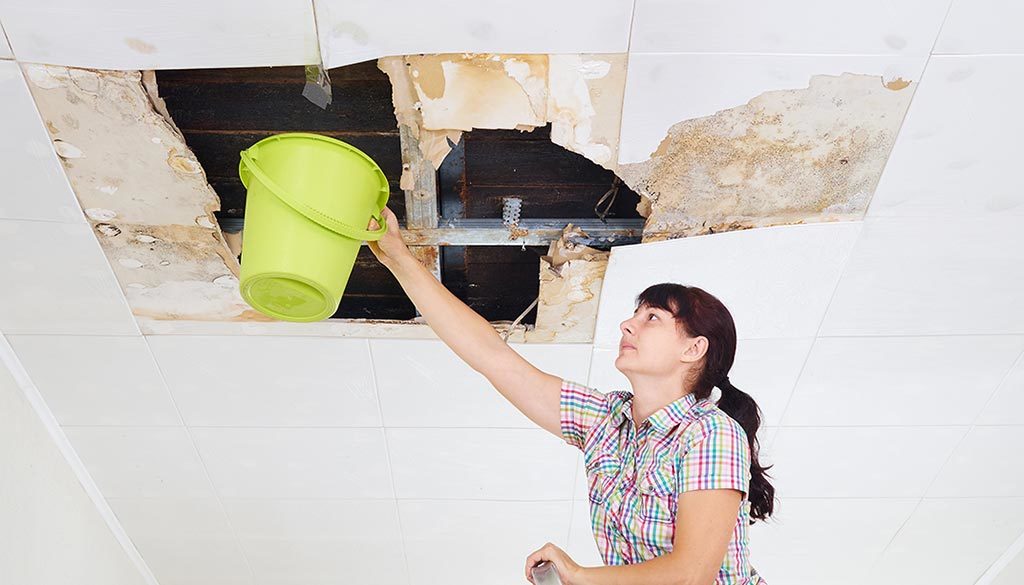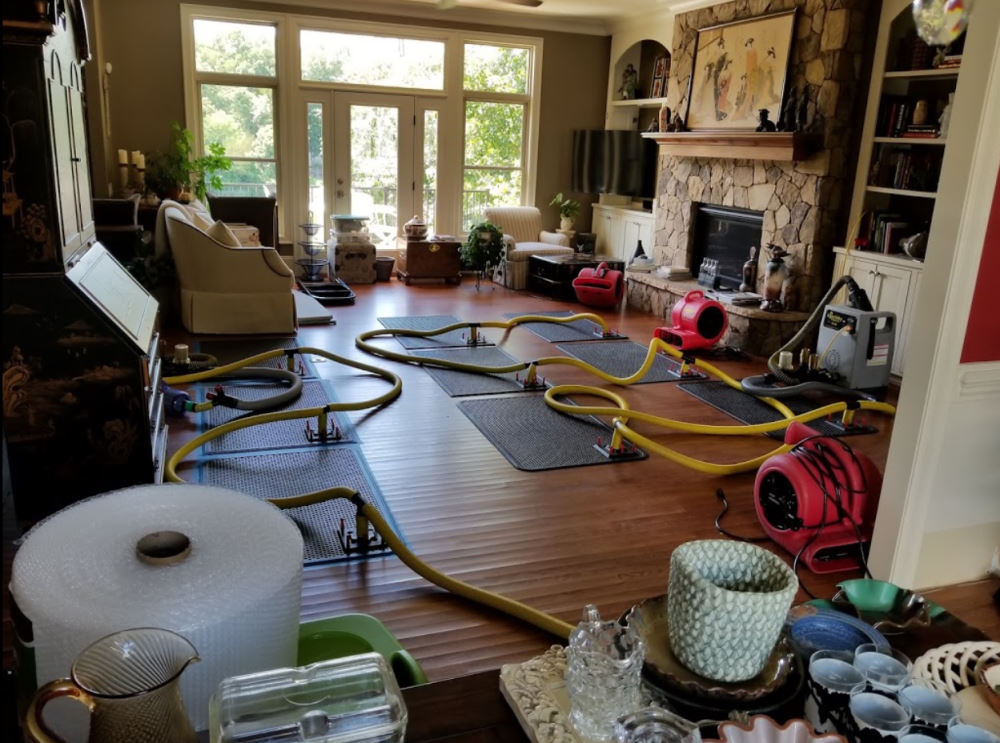Essential Actions to Comply With for Effective Water Damages Remediation in Your Home
When confronted with water damage in your home, recognizing the crucial steps for reliable repair can make all the difference. You require to examine the damage and warranty safety and security before tackling the trouble. Quiting the resource of water is necessary, but it's simply the beginning. Once you have actually managed that, there's a collection of actions you have to take to shield your property from additional issues. Let's discover what you need to do next.
Examine the Damages
The initial action is to evaluate the damages thoroughly when you find water damages in your home. Beginning by identifying the resource of the water breach. Check for leaks, ruptured pipelines, or other problems triggering the trouble. Next, analyze the influenced areas for visible indications of damage, including discoloration, mold and mildew, or bending growth. Don't neglect to search in hidden spots like behind walls or under floor covering, as water can seep into these areas unnoticed.Document the damages by taking clear images and notes. This will certainly help you when reviewing the situation with your insurance coverage copyright or restoration professionals. Take notice of the type of materials affected, as different products call for various remediation techniques. Review the level of the damages. Is it minor or comprehensive? Recognizing the range will guide you in deciding whether to manage it yourself or call the professionals for a much more substantial remediation process.

Make sure Safety and security
Prior to you start any remediation work, ensuring your security is crucial. Assess the condition of your home. If the water's deep or if you discover electrical risks, do not go into the location. Turn off the power and gas supply to stop crashes. Put on safety equipment like masks, boots, and gloves to shield on your own from impurities or mold.It's essential to remain conscious of your environments; look for slippery surface areas and sharp things. If the water is from a sewage backup, treat it as contaminated materials. Keep youngsters and animals away from influenced areas to prevent exposure.Once you've taken these safety measures, you can wage the repair procedure. Keep in mind, your security comes initially, and if you're ever unclear, it's ideal to get in touch with a specialist. Taking these steps will aid guarantee you're ready to take on the remediation safely and properly.
Stop the Source of Water
After guaranteeing your safety, the following step is to stop the resource of water. Identify where the leakage is coming from. It can be a ruptured pipe, a malfunctioning device, or even hefty rainwater getting in with a damaged roof covering. If it's a plumbing concern, switch off the major water system to your home to avoid more flooding. For home appliances, disconnect them and turn off their water valves.If the source is outdoors, like rain, try to divert it far from your home making use of sandbags or other obstacles. For small leaks, you could be able to use tape or a sealant momentarily until an expert can repair it. Remember, attending to the resource rapidly is vital to lessening damages and preventing mold and mildew development. Once you have actually quit the water, you'll remain in a better setting to carry on to the next action in the remediation procedure.

Remove Excess Water
Act quickly to get rid of excess water, as standing water can cause much more comprehensive damages and mold growth. Collect your devices: a wet/dry vacuum, pails, and towels. If the water is superficial, you can use towels to take in the wetness. For much deeper water, a wet/dry vacuum is your best choice. Ensure to empty the vacuum cleaner frequently to stay clear of overflow.If the water is contaminated, like from a sewer backup, use safety gear, consisting of masks and gloves, to maintain yourself risk-free. Once you've gotten rid of as much water as possible, examine for covert pockets of dampness in corners and under furnishings, as these can harbor mold.Don' t fail to remember to switch off electrical devices and power outlets in damp areas to stop hazards. This first step is necessary in decreasing damage and establishing the stage for an effective reconstruction process.
Dry and Dehumidify the Location
Once you've eliminated the excess water, it's necessary to dry and evaporate the location thoroughly. Begin by utilizing dehumidifiers properly to pull wetness out of the air and protect against mold development. Maintain an eye on humidity levels to assure the space dries totally.
Remove Standing Water
To successfully deal with water damages, you require to concentrate on removing standing water as rapidly as possible. Beginning by collecting essential tools, like a wet/dry vacuum or a pump, depending on the volume of water. If the water is shallow, a vacuum cleaner needs to do the trick. For bigger quantities, a pump is extra reliable. While functioning, make certain to use safety equipment to keep yourself secure from impurities. As you remove the water, focus on hidden areas like under furnishings or in edges where water could accumulate. Your space will certainly start to dry out top article once you have actually eliminated the bulk. This action is crucial, as lingering water can lead to mold and mildew development and much more comprehensive damage.
Usage Dehumidifiers Efficiently
How can you properly utilize dehumidifiers to dry and evaporate your area? Start by positioning your dehumidifier in the most affected location, ideally where water damages is most serious. See to it to shut all doors and home windows to produce a covered atmosphere. Activate the dehumidifier and established it to the suitable moisture level, usually around 30-50%. Vacant the water collection tank often, or consider making use of a design with a continual drain option for comfort. Ideally, utilize fans to improve air movement, assisting the dehumidifier job much more successfully. Keep the dehumidifier running till you're positive that the location is completely dried, stopping mold development and additional damage (Water Damage Restoration St George UT). This action is vital for reliable water damage repair
Monitor Moisture Degrees
Tracking moisture levels is crucial throughout the drying out process, as it aids guarantee your room continues to be cost-free from excess wetness. Spend in a reputable hygrometer to track moisture precisely. Preferably, you wish to preserve degrees between 30% and 50%. You might require to adjust your fans or dehumidifiers to improve air movement if moisture analyses climb over this range. Check the readings consistently, especially in areas prone to dampness, like shower rooms or cellars. If you see relentless high moisture, take into consideration increasing ventilation or using additional dehumidifiers. Remaining on top of these degrees not just speeds up the drying out procedure however also protects against mold and mildew growth, ensuring your home stays comfy and risk-free.
Clean and Disinfect Affected Surfaces

Bring back and Fix Your Home
After cleaning and decontaminating the influenced areas, it's time to restore and repair your home. Begin by reviewing the damages. Look for structural issues, like deteriorated walls or floorings, and address any kind of essential repair services. Replacing damaged drywall or flooring is necessary for both visual appeals and safety.If your furniture or valuables were impacted, take into consideration whether they can be recovered or need replacement. Tidy or skillfully bring back products where possible.Next, repaint wall surfaces and touch up any type of areas that need focus. This not just boosts look yet additionally shields surface areas from future water damage.Don' t neglect to check your pipes and home appliances for leakages, guaranteeing whatever's operating properly. Ultimately, take into consideration mounting a dehumidifier to avoid future dampness concerns. By taking these steps, you'll restore your home to its previous glory and create a much safer living setting.
Frequently Asked Questions
The Length Of Time Does Water Damages Reconstruction Commonly Take?
Water damage repair usually takes anywhere from a couple of days to several weeks, relying on the extent of the damages (Flood Damage Restoration). You'll intend to examine the circumstance promptly to decrease additional problems and ensure proper remediation
Will My Insurance Coverage Cover Water Damage Remediation Prices?
Your insurance coverage might cover water damage repair prices, however it depends on your policy. Examine your insurance coverage information and contact your insurance representative to clarify what's consisted of and what you require to file a claim.
Can I Handle Water Damages Remediation Myself?
You can deal with water damage remediation yourself, yet it's important to examine the scenario. If it's substantial, you could intend to call experts. Always prioritize security and guarantee you've got the right devices.
What Are the Indicators of Hidden Water Damage?
You might notice indications of concealed water damages like distorted walls, musty odors, or discoloration. If your floors really feel spongy or you spot mold, it's time to investigate better before the scenario aggravates.
Exactly How Can I Avoid Future Water Damages in My Home?
To avoid future water damage in your house, you ought to frequently evaluate plumbing, seal splits, keep seamless gutters, and warranty proper water drainage. Installing a sump pump and moisture barriers can additionally these details help maintain your space completely dry. When you uncover water damage in your home, the initial step is to analyze the damage extensively. Act quickly to eliminate excess water, as standing water can lead to extra considerable damages and mold development. To successfully deal with water damage, you require to focus on removing standing water as swiftly as feasible. As you remove the water, pay focus to hidden areas like under furniture or in corners where water may collect. Water damages restoration usually takes anywhere from a few days to several weeks, depending on the extent of the damages.